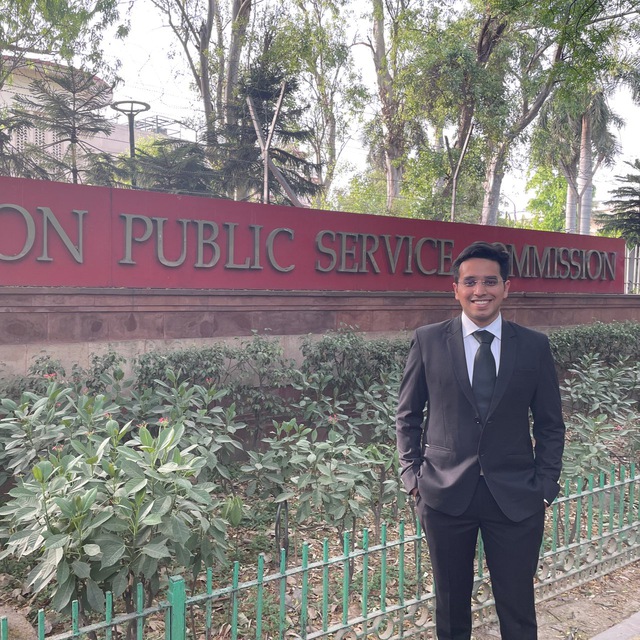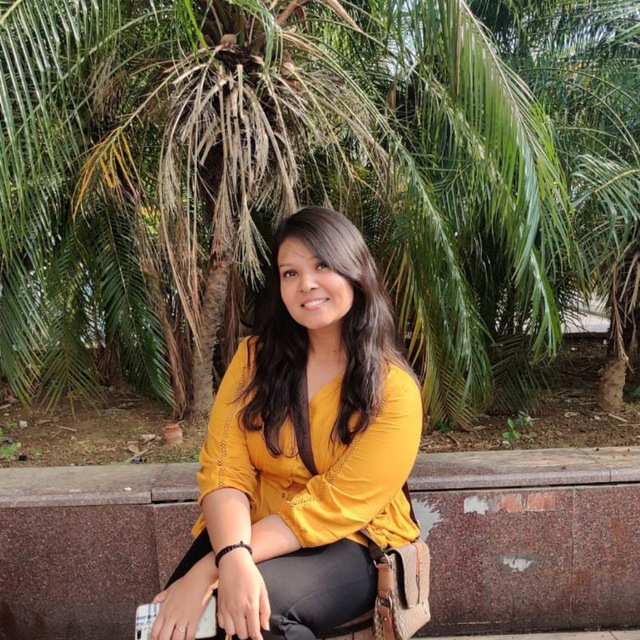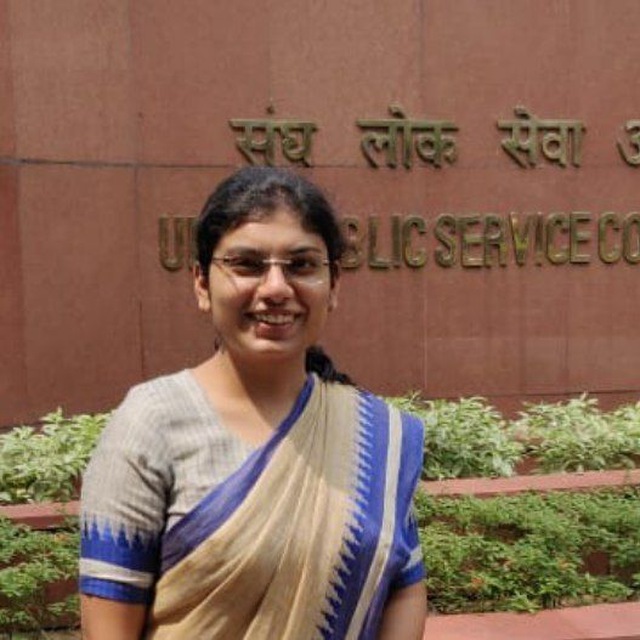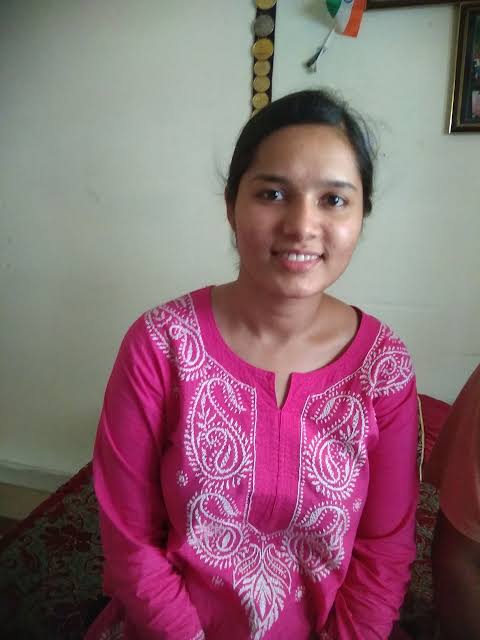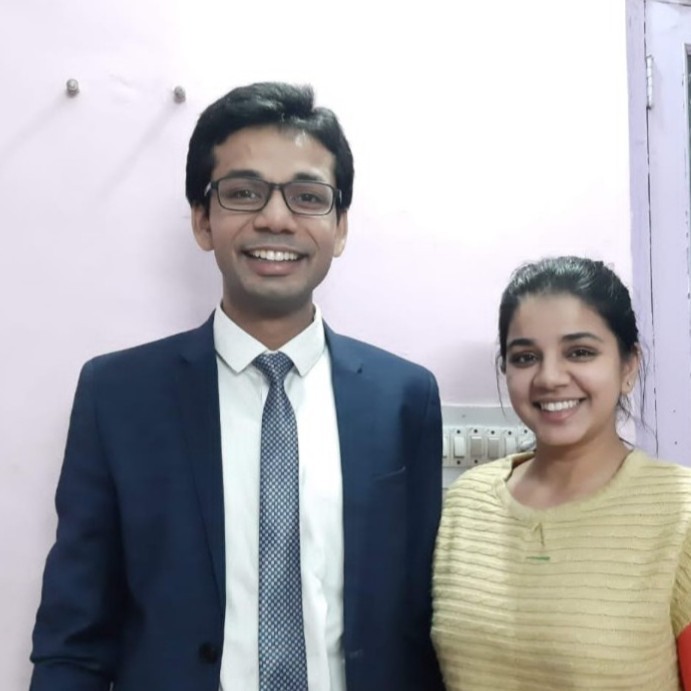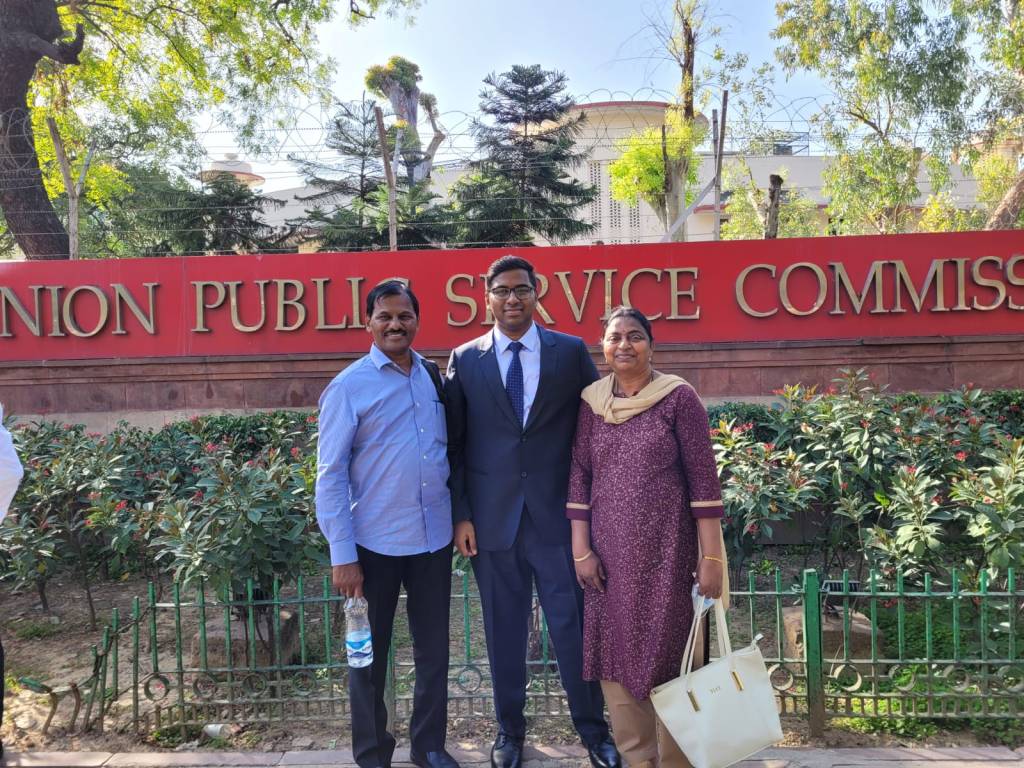
I am AIR 548 in CSE 2022. My name is Damera Hima Vamshee. I hail from Telangana. I have finished my graduation from IIT Roorkee in 2018, and since then I’ve been studying for UPSC CSE. This was my fifth time taking the test, and my elective is Sociology.
Table of Contents
Damera Hima Vamshee UPSC Booklist
Damera Hima Vamshee UPSC Marksheet (Prelims)
| Damera Hima Vamshee UPSC Marksheet (Prelims) | |
| Roll Number | 1028508 |
| Name | Damera Hima Vamshee |
| Paper 1 | Unknown |
| Paper 2 | Unknown |
Damera Hima Vamshee UPSC MARKSHEET (MAINS)
| Damera Hima Vamshee UPSC MARKSHEET (MAINS) | |
| Subjects | Marks |
| ESSAY | 127 |
| GENERAL STUDIES 1 | 92 |
| GENERAL STUDIES 2 | 109 |
| GENERAL STUDIES 3 | 86 |
| GENERAL STUDIES 4 | 105 |
| Optional Paper 1 | 127 |
| Optional Paper 2 | 125 |
| Written Total | 771 |
| Personality Total | 173 |
| Final Total | 944 |
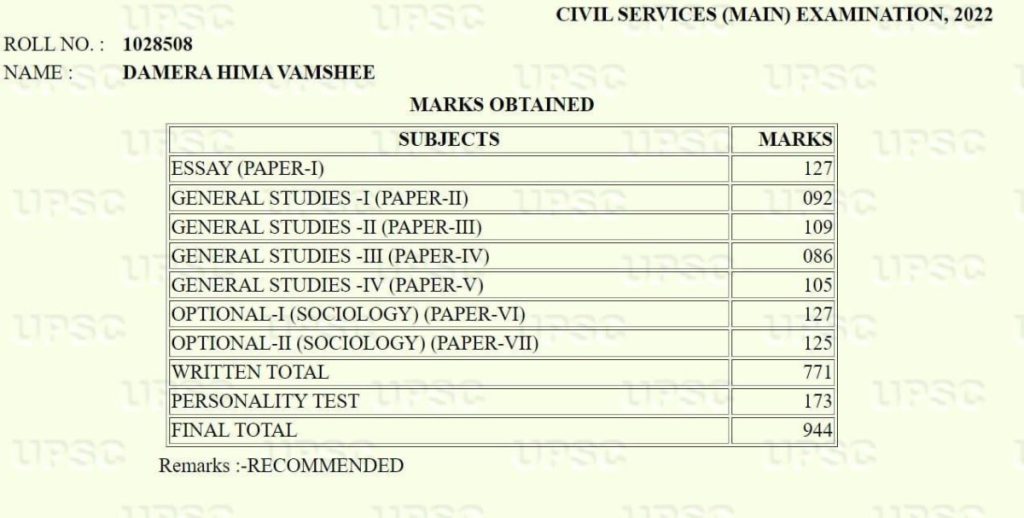
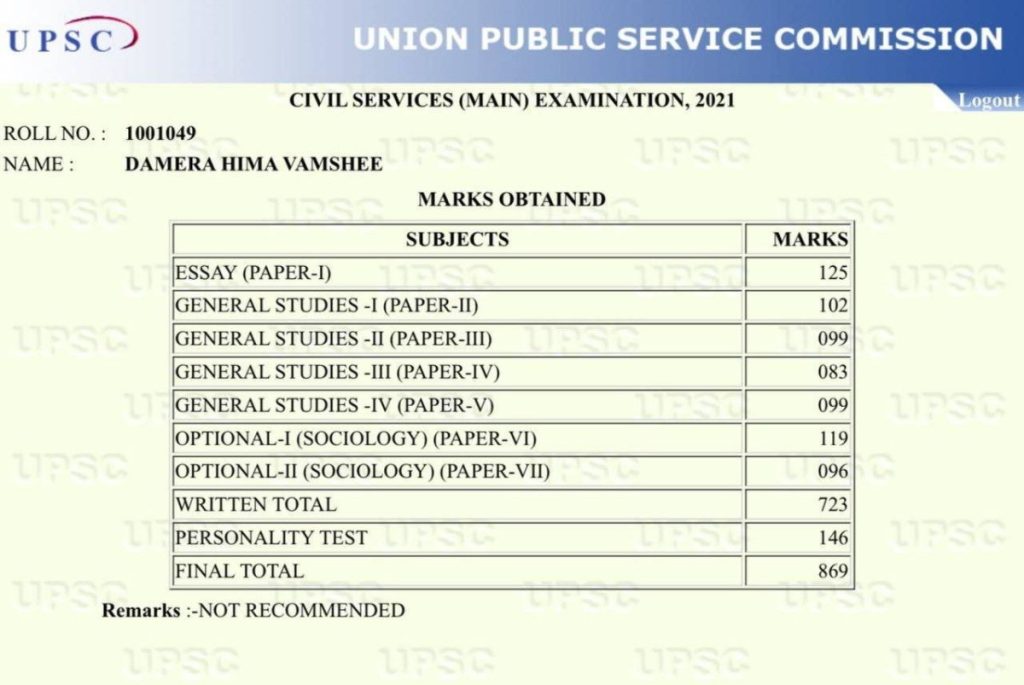
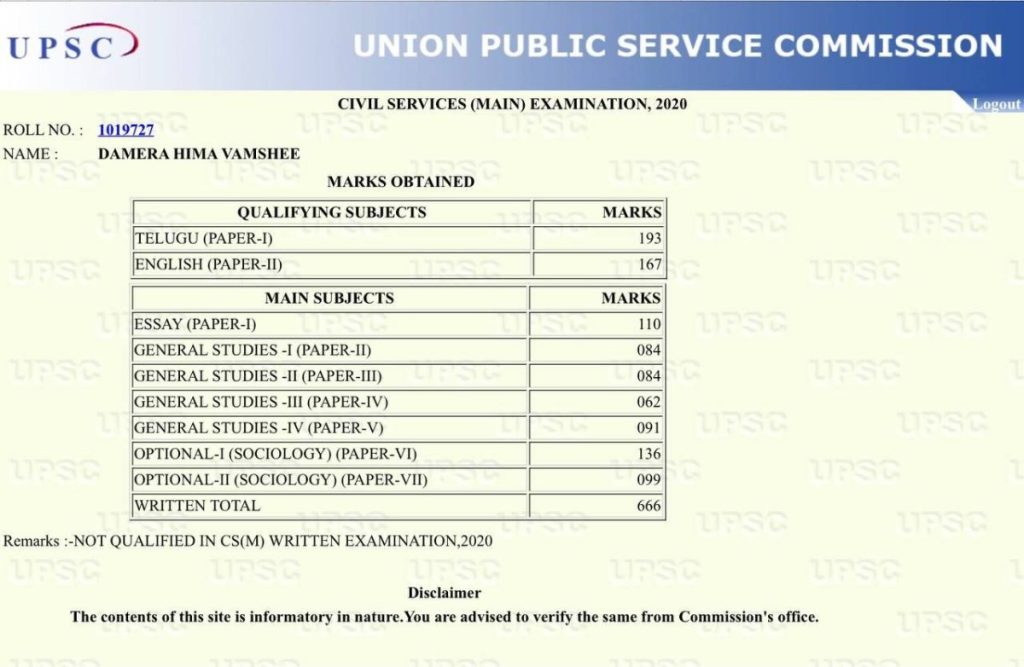
Damera Hima Vamshee Biography
| Damera Hima Vamshee Biography | |
| Particulars | Details |
| Name | Damera Hima Vamshee |
| Age | Unknown |
| All India Rank | 548 Rank |
| Roll Number | 1028508 |
| Marks | 944 |
| Optional Subject | Sociology |
| Hometown/City | Telangana |
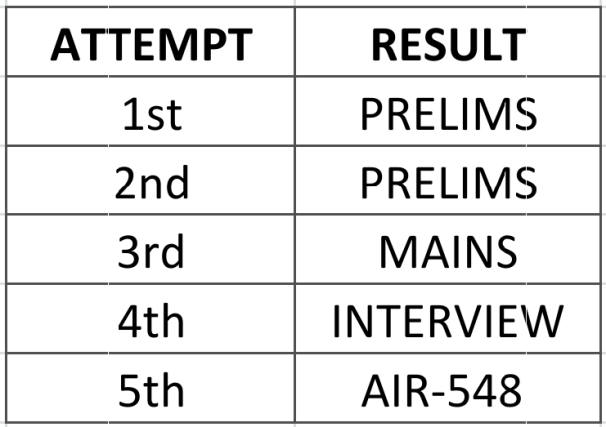
Even though the beginning looks simple, the journey itself has been anything but easy. It was stressful, hard, and filled with unknowns. During my long five-year journey, I had many failures and times when self-doubt almost got the best of me. There were also times when I had to use all of my mental and physical strength.
But I made sure that the failures didn’t go to waste. I did learn a lot from them, though. And these are what helped me move forward and keep getting better with each try.
My UPSC journey & the Lessons learnt in the process
(I won’t talk about the sources that were used, since many toppers have already done so. And mine were pretty much the same)
First try: I had just graduated from college, so I didn’t know much about the test or how it worked. Went to the test, but of course didn’t pass Prelims.
So, you can’t pass UPSC without doing a lot of work. Most of us can’t, at least. This message was clear and loud.
2nd try: I did a lot of studying. Read and reread all the Standard books. But even so, I didn’t pass Prelims. That made me sad and make me think
After thinking about it, I realised I had made some big mistakes that needed to be fixed right away.
I need to look at PYQs. This will help me figure out which parts of my studies to focus on. I should take enough tests. The way you think about writing a paper is very important. It teaches us how to handle our time and stay calm and collected during tests.
On my third try, I fixed the mistakes I made on my second try. So, I did pass Prelims with a good score this time.
Then Corona came along. I was sick for about three weeks. And the fact that nothing was certain made the time that was left even worse.
I did everything I could, but I couldn’t pass Mains. Up until now, I’ve been focusing on getting ready for Prelims. I did well on that, but I didn’t realise that the Mains part is the one that really counts.
I learned that it’s important to study for both the Prelims and the Mains. If we do well in one but not the other, we won’t get anywhere.
4th try: I also studied a lot of the Mains curriculum. So, this time I passed both the Prelims and the Mains. This was the first time I could go to the interview. I really wanted to pass this time. But, he was a few points short of the final cutoff.
On my marksheet, it said that I did badly on the optional and interview parts. I learned not to put all my hopes on one or two projects, but to work hard on them all.
Fifth try: It was hard. After the big loss 5 days before, it was hard to do well on Prelims. It was hard to get up the courage to go to the test. But I managed to do it. Passed the prelims.
This time, I didn’t rely on just one paper. Instead, I found key points in each paper. I tried to prepare for each paper in a way that balanced the risks.
Did multiple edits, value addition, gave mock tests etc. Talked about it with friends who were good at their own things. This time, though, it worked.
I also worked hard to get ready for the interview by figuring out my DAF areas and Current Affairs and working on them. The time I spent talking with my PT Extended Family was very helpful.
I also did a lot of practise interviews. Even though their reviews should be taken with a grain of salt, this practise helped me feel more confident when I had to talk to people in a formal setting.
The Result Day
When I saw the result, it was like 5 years of hard work flashed before my eyes in about 5 seconds. It’s a moment of pure happiness that came after years of hard work and staying strong.
Along the way, there have been a lot of setbacks, problems, and doubts. But this overwhelming feeling of accomplishment has made up for everything.
I was happy and excited, but what I felt the most was relief.
I’ve been lucky enough to find great friends (I’d rather call them family) who have been there for me from my first failure to my current success. I am very thankful for all the help I’ve gotten.
This accomplishment is just the start of a great journey in service to our country.
Sociology: A Ten-Point Plan
All that I’ve learned and improved in the five years I’ve been taking Sociology extra. I’ll try to keep it short but as complete as I can.
- Learn the syllabus and carefully read the PYQs.
Part of the process that is the most important. To connect ideas, you need to know what’s on the paper.
And the PYQs help us figure out what we should focus on while we study. Many questions from PYQs are often asked again. - Get a good grasp of how things work
This is a crucial step. Remember that we can only write good answers if we understand the question.
For this, people can take any training if they can. But YouTube works just as well. I’ve watched movies of Sleepy Classes that are free to watch on YouTube.
When needed, they can also watch videos about a certain idea. Videos by Prevoyance mam on a Telegram group called “Deciphering Sociology” helped me out more than once. - Don’t give out too much
At first, I tried to learn from a lot of different sources, but that really didn’t help. Once we have a clear idea of what we’re doing, it’s best to stick to a small number of tools.
Essential Sociology by Nitin Sangwan Sir and the class notes from Sleepy were my main sources of knowledge. Material from IGNOU is very helpful for the Thinkers part. I wouldn’t recommend the whole IGNOU course because it’s too big.
(I did read parts of Ritzer and Haralambos’s books, like Methodology, but most of Sleepy Classes’s notes are from Haralambos. So there’s no need to make another one.) - Take short notes to help you study Multiple times
I wrote down some short notes. Based on the syllabus, I made pointer notes for almost all of the parts. This makes it easier to quickly review and remember information.
This gives us a list of terms as well. When we use these words, our replies become sociological. This is how we tell the difference between GS replies and Sociology answers. - Do Value Addition
This section has Thinkers, Current Examples, Case Studies, Diagrams, Quotes, and other interesting things. Try to keep them on topic and make sure they are still useful.
Make sure you don’t go too far with adding value. Don’t put too many Thinkers and cases in your answers. Keep them at their best and most useful.
Value-added content is like butter, and regular content is like bread. It only tastes good when there is enough butter in it. Too much of it will ruin the flavour. - Write a daily answer
Start writing replies after you’ve finished a big chunk of the syllabus. Start with PYQs if you can. Even if you only write 2 Questions a day, you can get a lot done.
Writing replies helps us improve our notes as well. Most of the time, good notes lead to good answers. They go together. - Make each part of your answer better.
Break down the answer and make a list of all the things that need to be in a good Sociology answer.
Use these criteria to keep judging each answer you write. And try to get better at these things. When we’ve written 10–15 questions, we’ll be able to see trends.
If most of the questions have weak openings, work on making them better. If there aren’t enough cases, you should stress the ones you do have. - Come up with sample solutions for the PYQs
An analysis of PYQs shows that about 70% of Paper 1 questions and about 50% of Paper 2 questions are repeated.
Because of this, it’s very important to come up with answers for PYQs. Having answers to more than 50% of the questions ready before the test will help a lot.
I met with a friend to come up with ideas for Socio PYQs. We tried to come up with sample answers for Sociology questions that have been asked in the last five years. This activity was very helpful. - Give full-length tests as practise.
It’s one thing to write a few good replies. It’s a whole other thing to write 19 good answers in 3 hours.
It takes immense practise. Review your notes more than once, and make sure to take full tests. Write like you’re taking a test. That’s how we can get a true picture of how well we’re doing.
Keep to the set times. Don’t worry about getting bad grades. Low score is never a problem; staying at a low score, on the other hand, is. And standstill wouldn’t happen if all the steps above were done right. - Have faith in your work
Trust the process, as Dhoni says. Since each of these is a small step, the changes might not be very clear when we first start. But when these steps are taken together and given enough time, they make huge changes.
We can only do so much to change things. No matter what you do in life, you can’t deny that luck is a part of it. Still, hard work is what puts you in a place where good luck can find you.
We have done enough to take care of the things we can. So have faith in your work. You will do good.
The Big Learning from UPSC journey
This trip is tough. There will be times when we don’t want to study or do things we don’t want to do. But we have to do the things we have to do, even if we don’t want to. That’s what professionalism is.
I’d like to compare this to the case of Virat Kohli.
We all know how serious he is about getting in shape. He works out for hours and runs around the ground many times. He also said he gave up his best foods (Garlic Naan and Butter Chicken).
No one really wants to do all of these things.
No one wants to give up so many things at once. But he still does it. Not because he likes doing these things, but because they help him do what he really wants to do. That means to play cricket for the Indian team.
This kind of dedication always makes me feel good. As a person and an aspirant, I will always hold this concept close to my heart.
So, that’s it. I hope you do well on this test and in life in general. All the best.

